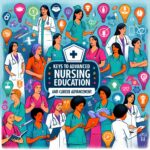Introduction
As nurses continue to be an integral part of the healthcare system, the need for advanced education in the field has become increasingly apparent. Nurses are required to keep up with the rapidly evolving medical landscape, necessitating continuous learning and professional development. This article provides top educational tips for nurses seeking to advance their careers through further education. It covers the importance of advanced nursing education, available resources, and strategies for balancing work, studies, and personal life. Three compelling reasons why this is significant are:
• Continuing education keeps nurses current with innovations in medical care and patient management.
• Advanced education can open doors to leadership and specialized roles within the healthcare sector.
• Education resources provide a flexible platform for career advancement, allowing nurses to learn at their own pace and convenience.
Importance of Advanced Nursing Education
Advanced nursing education plays a critical role in the development of competent, well-rounded healthcare professionals. It enables nurses to provide high-quality patient care, apply evidence-based practices, and lead healthcare teams effectively. As the American Association of Colleges of Nursing states, advanced education prepares nurses to “navigate a diverse and complex healthcare environment.”(“The Impact of Education on Nursing Practice”)
Available Resources for Advanced Nursing Education
There is an array of resources available for nurses seeking advanced education. Online platforms offer flexible learning options, enabling nurses to balance their studies with work commitments. Some key resources include the American Nurses Association’s Continuing Education modules, online courses from reputable universities, and specialized nursing journals. (“ANA Enterprise | Continuing Education”) Additionally, as highlighted in the article titled, “Advanced Nursing Education Resources For Career Advancement”, there are also professional organizations and scholarship programs that support nurses’ educational pursuits.
Strategies for Balancing Work, Studies and Personal Life
Balancing work, studies, and personal life can be a challenge for nurses pursuing advanced education. Developing effective study habits, as discussed in the article “Essential Study Habits For Passing The Nclex Exam On The First Try”, can play a crucial role in managing this balance. Practical strategies such as time management, setting realistic goals, and seeking support from colleagues and family can also be beneficial.
Utilizing Clinical Rotations for Career Advancement
Clinical rotations provide excellent opportunities for nurses to apply their theoretical knowledge to real-world situations, develop practical skills, and gain exposure to various healthcare settings. As discussed in the article “Practical Strategies For Nursing Students To Succeed In Clinical Rotations”, making the most of these experiences can significantly contribute to career advancement.
Conclusion
In conclusion, pursuing advanced education is a worthwhile investment for nurses seeking to enhance their knowledge, skills, and career prospects. With the right resources and strategies, nurses can successfully navigate their educational journey while managing their work and personal responsibilities. Continuing education not only benefits individual nurses, but also contributes to the overall quality of patient care and the progression of the nursing profession.






